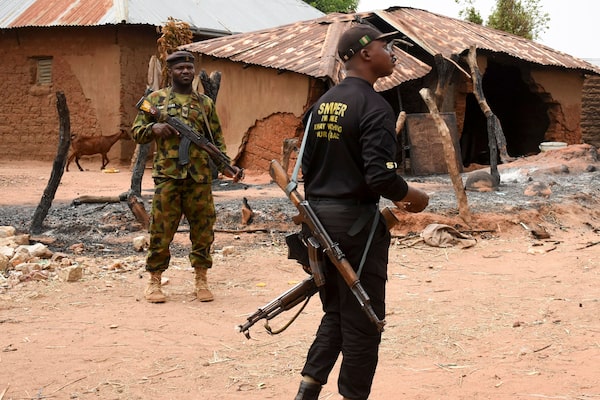
Security personnel stand guard in the Kukawa Village in the Kanam Local Government Area of the Plateau state on April 12 after resident's houses were burnt down during an attack by bandits.-/AFP/Getty Images
Dozens of passengers kidnapped five weeks ago from a train near Nigeria’s capital are being used as human shields by their abductors, President Muhammadu Buhari said.
More than 100 travellers were kidnapped in late March in Nigeria’s troubled northern region when a passenger train was halted by an explosion and then attacked by gunmen who killed eight people on board.
The kidnappers “are using civilians as human shields, thereby making it difficult to confront them directly,” Buhari said in Abuja, the nation’s capital, on Monday. “They don’t care about killing their hostages if they come under attack.”
The Nigerian president described the situation as a “delicate” one that requires wisdom and patience. Buhari was speaking at his offices to some residents of the capital and he appeared to be responding to distraught families who have been demanding that their loved ones be freed.
“Any rescue operation that results in the death of any hostage cannot be deemed a success,” he said, insisting that his aim is “to see all those in captivity safely rescued.”
The passengers were kidnapped by an armed gang, one of several that have been terrorizing remote communities in northwestern and central Nigeria.
In addition to the train hostages, hundreds of other Nigerians are being held captive across the troubled northern region, especially in the northwest where they are being held for kidnap ransoms, say authorities.
The attacks are often by large groups on motorcycles carried out by young men most of whom authorities have said are from the Fulani ethnic group caught up in the years-long conflict with Hausa and other ethnic groups over land.
The conflict over access to land and water has further worsened the sectarian division between Christians and Muslims in Nigeria, Africa’s most populous nation with its 206 million people deeply divided along religious lines.
Those armed groups are now working with the jihadi extremists who have been waging a 10-year insurgency in the country’s northeast, according to the Nigerian military.
More than 4,000 people were killed in Nigeria’s armed violence last year, according to data from the U.S. Council on Foreign Relations which collates incidents reported by Nigeria’s media.
Buhari said the armed groups – who Nigerian authorities recently declared terrorist organizations – are “pushing their luck” but added this is “only for a while before they are finally crushed.”
Our Morning Update and Evening Update newsletters are written by Globe editors, giving you a concise summary of the day’s most important headlines. Sign up today.